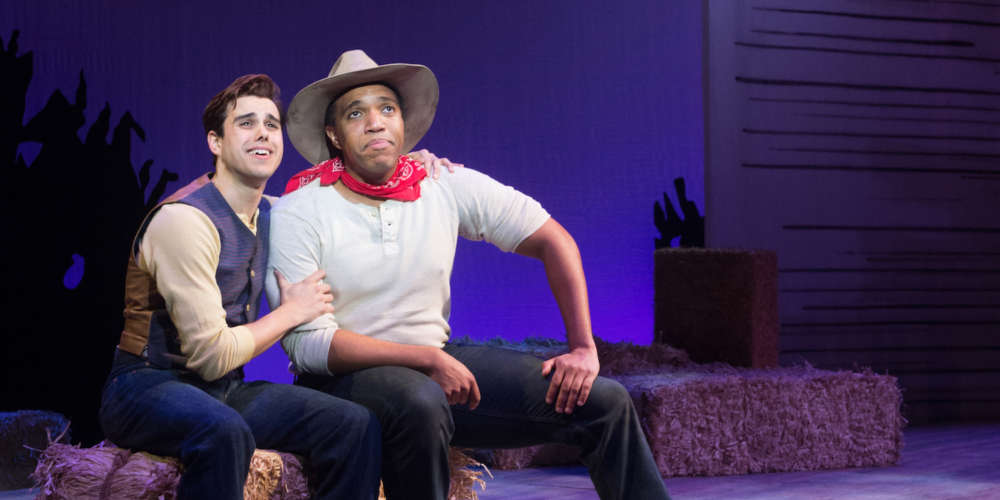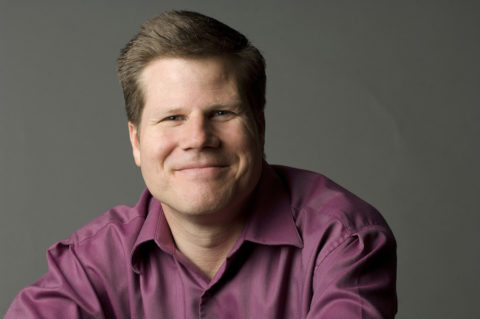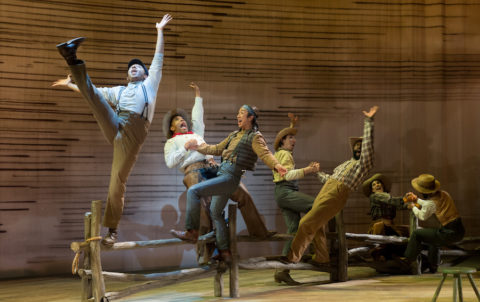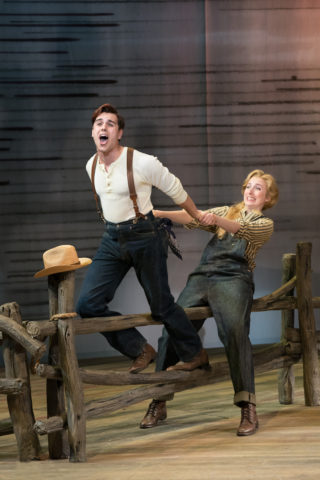Originally published by Hornet
Rodgers and Hammerstein, queered

Ado Andy (Jonathan Luke Stevens) and Will Parker (Jordan Barbour). (Photo: Jenny Graham, OSF)
Raise your curtains of preconception and imagine a musical:
There’s a spunky, sexually adventurous gay boy pursued by a hardworking man, a few years older, who wants tame the young’n’s wandering eye and get domestic.
There’s a sheltered, uncomfortably ambiguous girl, torn between the attentions of a slow-burning hunk and a worldly woman.
The voice of wisdom belongs to an elderly transsexual aunt.
Is this the latest work from the creators of Hedwig? An acting maxi-challenge on Drag Race? The fever dream of a progressive millennial show queen?
In fact, it’s the groundbreaking 75th anniversary production of Rodgers and Hammerstein’s Oklahoma! playing through October at the Oregon Shakespeare Festival (OSF) in Ashland, one of the largest and most widely acclaimed non-profit theater companies in the U.S.
Having grown phenomenally since its founding in 1935, OSF’s second and third initials can create confusion today: As evidenced by Oklahoma!, the works of the Bard represent just a fraction of its productions. And with the exception of November through January, it runs all year long; which has transformed Ashland, a town of 20,000, into an artsy, foodie, queer-embracing oasis in conservative rural Oregon.
For gay theater lovers, OSF’s Oklahoma! is a destination event. The acting and production quality is as high as you can find on Broadway. And director Bill Rauch’s vision is ingenious; in changing the gender of lead characters he simultaneously gives this classic/chestnut (Take your pick) a thrilling jolt of freshness and reveals the essential timelessness of the original.
If you’re familiar with Oklahoma! from the 1955 film or a school or community theater production, you’ll remember the flirty, comic role of Ado Annie. Well, Ado Andy, is male now.
Curly, the cowpoke who pines for Laurey is a woman. Aunt Eller is trans.
And in what’s long seemed like the whitest of whitebread musicals, both Curly and Will, Andy’s suitor, are African American.
But except for the occasional shift of a “he” to a “she” or “girl” to “boy” and vice versa, the original script and song lyrics of the songs haven’t been changed.

Bill Rauch, Artistic Director, Oregon Shakespeare Festival
A gay man, director Rauch — who, since 2007, has also been Artistic Director of OSF in its entirety — has long been attracted to the idea of mounting old-fashioned Oklahoma! in a new-fangled way.
“I was in my high school’s Oklahoma!” says Rauch, 55. “And since then, I’ve often thought about whether it could be done with the lead roles as same-sex couples.”
“To be honest though, I felt like it was idle fantasy. I didn’t think I’d live to see the day when we’d be at the point in terms of rights and acceptance in the United States that there would be an audience for this. Or that the Rodgers and Hammerstein estate would let it be done.”
But Rauch kept musing over the idea and discovering angles to support it. “Lynn Riggs, the playwright of Green Grow the Lilacs, which Oklahoma! was based on identified as gay.”
Rauch also learned that Riggs was part Cherokeee. And that despite the imagery presented in productions of Oklahoma! the musical, the 1906 Oklahoma territory had a population that included more Native and African- Americans than whites. It made perfect sense for his production to be diverse racially as well as sexually.
To Rauch’s surprise, when he finally submitted a proposal a couple of years ago, it was approved by the estate. “And its not as if I was asking to do a one-time special event. By October, we’ll have done over 80 performances.”
Oklahoma!, Rauch notes, “is considered the grandparent of all musical comedy, for the way it integrates song and dance into the story.”
But like many grandparents, it’s a bit out of touch with younger generations. The disconnection young people have often felt in their first encounters with Oklahoma! has little to do with the sexuality or gender of its protagonists, but with the hokier tropes of the American west:
Cowboys and surreys and steer. Ohhhh my.

The ensemble (Photo: Jenny Graham, OSF)
Rauch captures audiences’ attention not only by featuring same sex couples dancing and romancing, but also by emphasizing aspects of the existing story that have parallel relevance in today’s America.
“It’s a frontier story,” says Rauch. “One of the main themes is building a new kind of community.”
Set in 1906, before Oklahoma was a state, the musical’s plot incorporates the social tension between farmers and cowboys, who have differing opinions on land use and ownership.
Those particular issues may not feel particularly resonant today. But the need for people with diverse perspectives to compromise, get along, and move forward is hardly an outdated one. There’s dialogue in Oklahoma! that, spoken by LGBT characters may speak to grandparents in the audience in a whole new way:
“Oh, things is changin’ right and left,” says the now-female Curly, ” …Country a changin’, got to change with it.”
Oklahoma! always opens with “Oh What A Beautiful Morning,” but at OSF that song’s sensibility resonates through the length of the show. It’s a production that exudes optimism and idealism, welcoming a new day of acceptance and inclusion.
Jud Fry, the one dark and domineering character in the musical never really stands a chance in OSF’s Oklahoma! He is toxic masculinity personified—then disinfected by this production’s particular sunshine..

Ado Andy (Jonathan Luke Stevens) explains his romantic predicament to Laurey (Royer Bockus) (Photo: Jenny Graham)
At a recent weekday matinee performance, several large high school groups were in attendance. They welcomed characters’ climactic embraces with approving “aaawwwws” and spontaneous applause. Many of these students had never seen Oklahoma! before. Perhaps someday, they’ll attend a gender-bent straight version.
For queer audience members, there are lines in Oscar Hammerstein’s original script and lyrics that take on amusing new shades of meaning when delivered among characters now portrayed as gay or lesbian:
Here’s Andy’s pa, blessing his son’s marriage to Will: “Take keer of her, son. Take keer of my little rosebud.”
Or Curly, aggressively tooting her own horn: “Who’s the best bull-dogger in seventeen counties? Me that’s who! And looky here, I’m handsome, ain’t I.”
And when “I Cain’t Say No” is sung by a man, the already humorous lyrics get funnier: “S’posin that he says that you’re sweeter than cream?/ And he’s gotta have cream or die?”
But those occasional bits of winking humor just add a little extra sizzle to what’s really at stake in this production. Among the most stirring moments in any Oklahoma! are the musical declarations of love. At OSF, it feels at once beautifully classic and utterly groundbreaking when Will gives Andy his “All Or Nothing” ultimatum and when Curly and Laurey croon “People Will Say We’re In Love.”
As presented by Bill Rauch and OSF, these indelible old melodies become catalysts for new ways of thinking.
Originally published at Hornet
